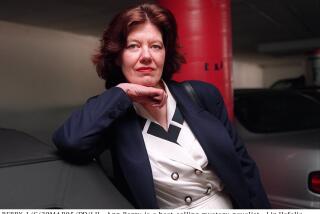‘Requiem’ Author Gets an Offbeat Farewell
Acclaimed author Hubert “Cubby” Selby Jr. was always dying. Dark themes like death were common in his books, including “Last Exit to Brooklyn” and “Requiem for a Dream,” and for years it was an encroaching enemy.
Selby died April 26 at the age of 75 of the lung disease that had plagued him since childhood. But family and friends remembered him Friday as sparkling, witty and cackling, a writer of gospel and speaker of profanities.
For the record:
12:00 a.m. May 13, 2004 For The Record
Los Angeles Times Thursday May 13, 2004 Home Edition Main News Part A Page 2 National Desk 1 inches; 31 words Type of Material: Correction
Hubert Selby Jr. memorial -- An article in Saturday’s California section about a memorial service for author Hubert “Cubby” Selby Jr. misspelled the last name of student Dya Englert as Englebert.
About 475 people attended the service at the Egyptian Theatre in Hollywood, including former Black Flag band member Henry Rollins, writer Jerry Stahl and Darren Aronofsky, who directed the movie version of “Requiem.”
“Each of us knew him as a different person, and that’s why we are here today, to put those pieces together,” said pediatrician William Selby, his son.
Cubby Selby had suffered breathing problems since contracting tuberculosis as a child, said Suzanne, his wife of 35 years. Several years ago, he was diagnosed with chronic obstructive pulmonary disease.
The illness dragged Selby in and out of hospitals during the last few months of his life and left him dependent on a cane and oxygen tank.
But Selby “wasn’t afraid of death,” said friend Jim Miller. “He said, ‘Once I get out of this rotten body, I’ll be great.’ ”
He had said his lung disease, in a roundabout way, made him a writer, said Dya Englebert, 38, one of Selby’s students.
At one point, Selby told his USC class, he realized “I’m about to die and what have I done with my life.”
He knew, Englebert said, “he needed to do something with his life, and he decided to become a writer.”
Still, one part of him questioned the calling, while another part said, “I know the alphabet and that’s all I need,” Englebert said.
As a writer of nine books, he often used his life as a model, and dying in one form or another -- often by drug addiction -- was frequently the theme.
“I knew Cubby was going to die,” said friend Judy Luby. “He walked with that swagger of his and he looked like he was going to fall down. I knew he was going to die, and that was 22 years ago.”
One time in the hospital, Selby told friend Joe Carafello, “We should write an opera using the sounds in these rooms.”
Then, Carafello said, he asked facetiously, “Is the world going to be OK without me?”
Selby’s daughter, Claudia Selby-Adams, remembered her father as having “the greatest laugh in the world.”
But, she said, “When I was a child, my father was a paradox to me.... He had a depth of understanding, but his mind was impaled by addiction.”
Her brother remembered when the clacking of their father’s typewriter keys “made the background music in my life.”
“A little part of me was disappointed when he started typing on the computer,” the younger Selby said. “It just wasn’t the same sound
Selby also is survived by two other children. His ashes will be scattered at sea.
Friends read excerpts from his work, imitated his Brooklyn accent and listened to a recording he left, which ended: “OK, that’s uplifting.”
Family members sent guests off with a classic Selby saying: “Give a good day.”
More to Read
Sign up for our Book Club newsletter
Get the latest news, events and more from the Los Angeles Times Book Club, and help us get L.A. reading and talking.
You may occasionally receive promotional content from the Los Angeles Times.






